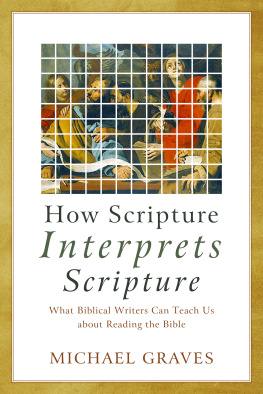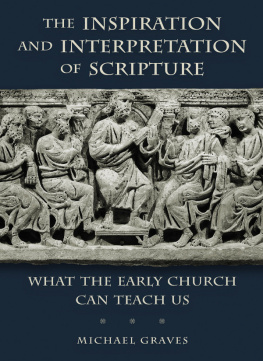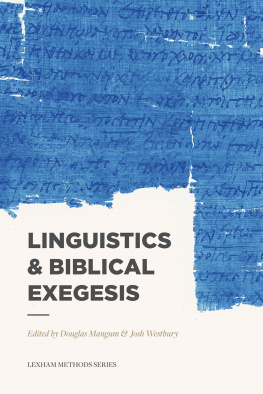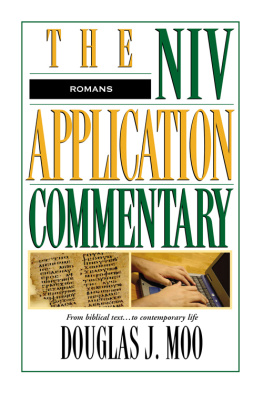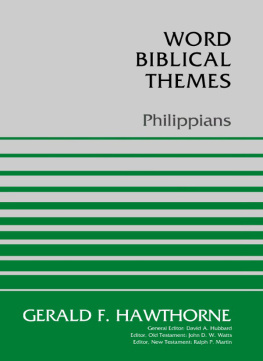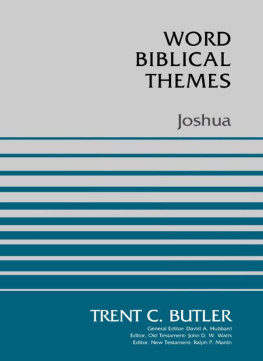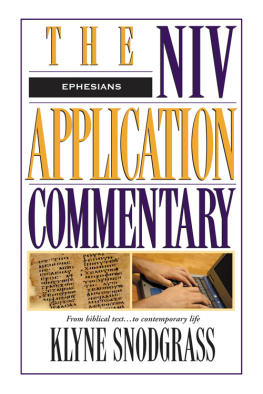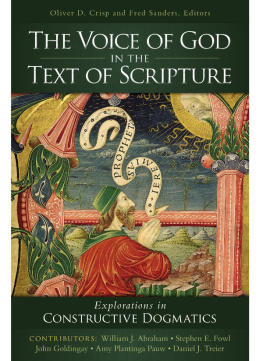Endorsements
New Testament professors might remind us that if Paul were to take our seminary exegesis classes, hed fail because he doesnt use the historical-critical method, which shows that theres something not quite right about what we teach. Graves joins a new wave of scholarship that challenges the adequacy of the historical-critical method, takes comprehensive theological exegesis seriously, and finds in the Scriptures themselves nothing less than Scripture interpreting Scripture in an unfolding drama that leads us into the wisdom of God. Knowing what an author meant in context may be the place to begin, but once we hear the text, we realize the Word of God is alive and at times takes us to unanticipated and wholly glorious places.
Scot McKnight , Northern Seminary
Gravess excellent work gives us a fresh appreciation of inner-biblical exegesis, showing how we canand should!continue to interpret Scripture for our times. He sets out clearly the principles and methods he uses, and he illustrates these through a study of well-selected themes. This is a careful and insightful contribution to biblical interpretation.
Havilah Dharamraj , South Asia Institute of Advanced Christian Studies
Through five interesting themes, Graves splendidly reveals how inner-biblical interpretation takes shape in the Old and New Testaments and its importance for Christian interpretation and application. He is a wise and discerning biblical exegete and evaluator of both ancient Near Eastern and early Christian sources. Readers can learn so much from this book about the spectrum of wisdom that the Bible offers for Christians today.
Michael D. Matlock , Asbury Theological Seminary
In this book, emphasis is placed on how the interpreting text applies or qualifies its inherited biblical tradition. In other words, Scripture interpreting Scripture is part of what shapes scriptural meaning long before we start to talk of the history of interpretation. This inspires and guides us in our own interpretation today. The book wears its learning lightly, yet the occasional turn to the biblical languages reveals the scholarly substructure. For example, corporate responsibility is clearly a key notion that has become unfashionable but is here well articulated. The Bibles concern for boundaries as real and necessary but also as starting points for relationship is also appreciated. An informed and rewarding operation in biblical theology is within these pages. It is wide ranging across the canon, judicious, and wise, a book from which the whole church (lay and expert) can learn much.
Mark Elliott , University of Glasgow and Wycliffe College, Toronto
The Reformation principle Scripture interprets Scripture receives a fresh treatment by Graves. While affirming the coherence of Scripture in Christ, the book carefully engages with the unique contribution of individual authors in their ancient cultural contexts, and in so doing provides thoughtful insights on the web of connections that link Old and New Testaments. By examining inner-biblical interpretation, both how one Old Testament text interprets another and how the New Testament authors interpret the Old Testament, Graves unveils principles of interpretation at work within Scripture, which modern interpreters can use to interpret and apply Scriptures teachings today. Interpretation is shown to be a processone whose goal is the clear communication of the Word of God to the modern hearer.
Jason Soenksen , Concordia University Wisconsin
Title Page
Copyright Page
2021 by Michael Graves
Published by Baker Academic
a division of Baker Publishing Group
PO Box 6287, Grand Rapids, MI 49516-6287
www.bakeracademic.com
Ebook edition created 2021
All rights reserved. No part of this publication may be reproduced, stored in a retrieval system, or transmitted in any form or by any meansfor example, electronic, photocopy, recordingwithout the prior written permission of the publisher. The only exception is brief quotations in printed reviews.
Library of Congress Cataloging-in-Publication Data is on file at the Library of Congress, Washington, DC.
ISBN 978-1-4934-3233-2
Unless otherwise indicated, Scripture translations are the authors own.
Baker Publishing Group publications use paper produced from sustainable forestry practices and post-consumer waste whenever possible.
Dedication
To Gary United Methodist Church in Wheaton
Contents
Endorsements
Title Page
Copyright Page
Dedication
Acknowledgments
1. Introduction: Interpreting Scripture and Inner-Biblical Interpretation
2. Corporate and Individual Responsibility: Individual Responsibility within Community Obligations
3. Insiders and Outsiders: Outside and Inside Exist, but Invite the Outsider to Join
4. Marriage, Polygamy, and Divorce: Human Well-Being Now, Closeness to God as the Ultimate Goal
5. Sacrificial Offerings: Devoting Our Lives Fully to God, Receiving the Greater Gift
6. The Afterlife: Old Testament Hopes Become Reality in Jesus
7. Biblical Interpretation Then and Now
Bibliography
Scripture and Ancient Writings Index
Subject Index
Back Cover
Acknowledgments
I would like to express my sincere gratitude to Wheaton College for granting me a research sabbatical in the spring term of 2020 to work on this book. For all the students who have taken my courses at Wheaton College over the past seventeen years, and for the many faithful students of the Bible whom I have had the pleasure to teach in local churches, I am truly thankful.
My experience working with Baker Academic has been very positive. I have benefited from encouragement and sound advice from Jim Kinney. Jennifer Hale has done an excellent job managing the production of the book. I am grateful to my graduate assistant at Wheaton College, Amy Allan, for her valuable assistance in proofreading and preparing the indexes.
This year has been special for our family. While I was writing this book, my son, Ben, married a wonderful person, Caroline. We could not be more thankful.
This book is dedicated to the people of Gary United Methodist Church in Wheaton, Illinois, who have been an abundant source of encouragement to our family. Gary Church is filled with the love of Jesus. This is an ideal setting for good biblical interpretation.
Introduction
Interpreting Scripture and Inner-Biblical Interpretation
M any people today doubt that the Bible has anything meaningful to say in our contemporary context. Even within the church, the usefulness of Scripture for helping Christians to navigate todays complex world is often not fully recognized. It is my belief and the testimony of Christians throughout the centuries that the Bible remains relevant and teaches what is essential for human well-being. Christians have traditionally accepted the truthfulness and usefulness of Scripture as necessary corollaries of believing in Jesus. Our confidence in Scripture is grounded in the testimony of Jesus and the early church. Jesus accepted Israels Scriptures (that is, the Old Testament) as sacred and authoritative. Christians who lived after the apostles commended these same sacred books as Scripture, together with other books pertaining to Jesus that eventually became the New Testament. Moreover, the Bible has continued to work in the lives of Christians to instruct, encourage, warn, and comfort. The purpose of this book is to illustrate and explain what we can learn about biblical interpretation by paying attention to how Scripture interprets Scripture. This kind of interpretation aims to help us grow closer to God, cultivate Christian virtues, and make wise decisions that demonstrate love for God and for our neighbors.

